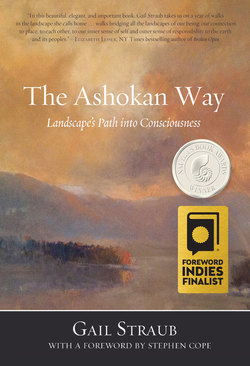Читать книгу The Ashokan Way - Gail Straub - Страница 14
На сайте Литреса книга снята с продажи.
My Father White Mountains and Red Blood
ОглавлениеIt is a heart-stoppingly lovely day. The first heavy snow has fallen and the sky is a piercing cobalt blue. The mountains are wearing white velvet robes as if they are dressed for the finest winter ball, soft clouds settling along their ridges like fur trimming their finery. Snow etches the tree branches as if a paintbrush has outlined each shape with the most delicate of touches. White snow on white birch is silent haiku. As I make my way through the spellbound alabaster landscape, a fierce love for these mountains—for all mountains—rises up in me and I begin to track the long body of my love affair with mountainous terrain all over the world.
My walking pilgrimages have taken me to the Adirondacks, the Alps and the Andes, the High Sierras and the Himalayas, the Rockies and the Red Rock Canyon Lands. My feet have made their paths in the Sahara’s Hoggar, the Gennargentu in Sardinia, Gunung Agung in Bali, and Croagh Patrick and Ben Bulben in Ireland. Here at home in the Catskills, what the native Esopus people called the wildcat mountains or the Blue Mountains, my walking has continued to induce that mystical spell that hikers know so well. But the genesis of this lifelong liaison began much earlier in the White Mountains of Maine, where I spent my childhood summers. And the larger truth about my passion for mountainous landscapes is that it’s all about my father.
From September through June, my father was a teacher at a private country day school in Wilmington, Delaware. July and August, however, found my Pop—and his family—deep in the Maine woods, where he helped run a boys summer camp. In the early 1950s, along with some of his Army buddies, my tall, strong father had built the camp’s dirt roads and rustic cabins, and in the years following the camp’s construction he stayed on as head counselor. Though my sister Joanie and I were girl outliers, my father made sure we learned how to hike alongside to the boys, including our brother Jimmy, and so at an early age Joanie and I knew the strenuous trails of Franconia Ridge, Pinkham Notch, Mount Katahdin, and most demanding of all, Mount Washington. Pop taught us to appreciate the cyclical rhythm of ascent and descent, and how to pace ourselves so that hiking became an extended contemplation. I have long known how fully my father passed on his love of the mountains to me. But it is only now, in my sixth decade, that I have begun to understand the fuller connection between my father and mountains.
Many evenings during those Maine summers, I would sit silently next to my Pop as we looked out over Kimball Pond and the White Mountains. Sunset colors would mix with the comforting smell of the pipe that he smoked in relaxed moments like this. Our silence was intimate, and even as a girl I knew the mountains were my father’s church. Though my mother dragged him to Catholic Mass every Sunday, I fully understood what was sacred to my father. I understand now that as we sat quietly in the company of the pond and the mountains we were praying. And I see why this was the only place that my father could pray. As a twelve-year-old boy, after watching his own father take a gun to his head during the Great Depression, what other God could my Pop ever trust but a steady, unshakable mountain range? My Pop spoke of father’s death only a single time during his lifetime, words spoken aloud just once, but unspoken each and every day. My father’s abiding strength of character was forged in the fires of suffering.
I never got to ask my Pop all the questions that still haunt me twenty-five years after his death. Did your father’s blood spill all over you? Did your mother comfort you, or did you hold her? Who cleaned up the unthinkable mess and how did you ever go on? Was it the constant presence of this trauma that made you determined to shape such a meaningful life for our family?
As a boy, my Pop had already lost his sister to tuberculosis by the time his father killed himself. And then when he was sixty-five, he lost his wife—my mother—the love of his life. Just when all his children were out of the nest and they could have enjoyed their later years together, she was taken from him and he was alone. The Sanskrit word for mountain is a-ga, meaning “that which does not go.” The White Mountains were a-ga for my father. And until he died at eighty-one years, my father was a-ga for me with his solid and constant presence. Now this mountain valley is a-ga for me. And each day, this place where I pray connects me to my father.
Now my tears mix with my father’s tears, and the solace so freely given by the White Mountains merges with that given by the Catskills here along the Ashokan Way. Is it always that the deepest sadness is most bearable in the company of the greatest beauty? These white, snow-covered mountains have allowed me to honor my grandfather’s spilled red blood and the strength of my father that was forged in that blood. And my love of these peaks is forever linked with my love for my Pop.
